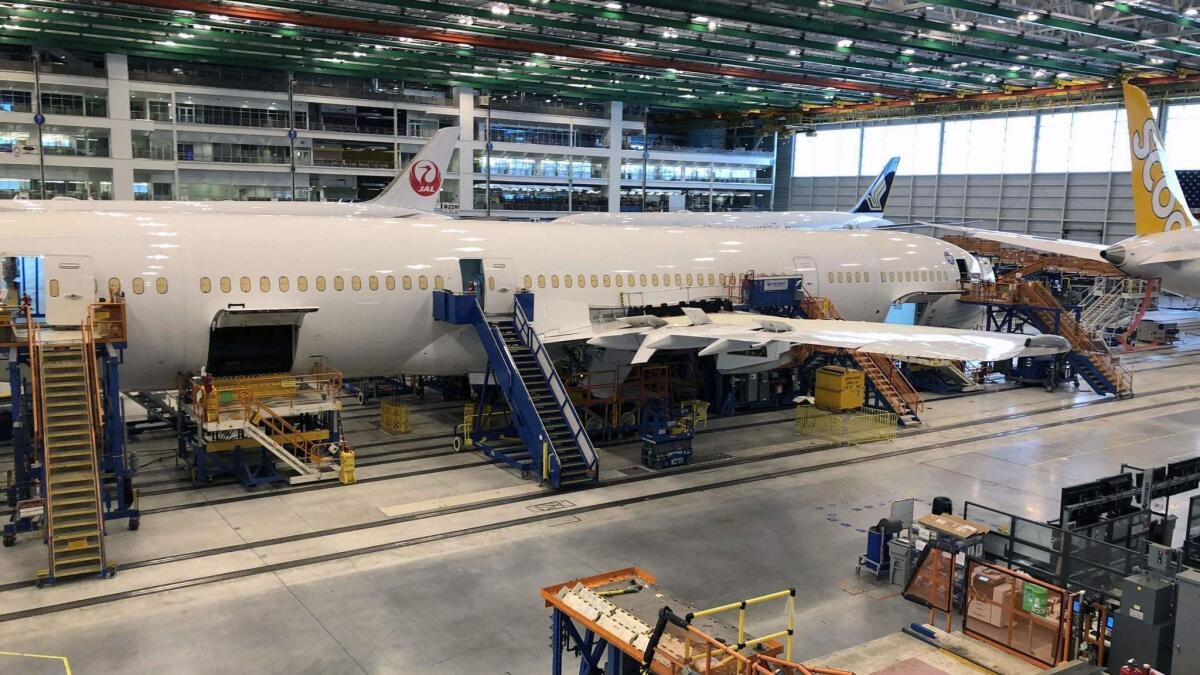How a U.S.-China trade war could hit airplane makers where it hurts

- Share via
China’s newly proposed tariffs on certain small airplanes, in addition to a wide variety of other American goods, suggest China could later slam tariffs on a scarier target: the jetliners it has increasingly imported from the United States, analysts said.
China announced Wednesday that it plans to levy a 25% tariff on more than 100 U.S. products — including airplanes that weigh between about 33,000 and 99,000 pounds. That wouldn’t touch the biggest jetliners, but the idea sent a shudder through the industry.
Boeing Co. said Wednesday afternoon that it would continue its own efforts to “proactively engage both governments” and that it was confident dialogue between the U.S. and China would continue.
“While both governments have outlined positions that could do harm to the global aerospace industry, neither has yet imposed these drastic measures,” the company said in a statement.
China’s retaliatory move came the day after the Trump administration proposed 25% tariffs on more than 1,300 Chinese goods, including aircraft, propellers, turbojet engines and other aerospace parts. That U.S. tariff proposal could increase planes’ prices: U.S. aircraft builders have increasingly routed supply chains globally, including through China.
But China has been importing more aerospace and defense goods from the U.S. than the U.S. has been importing from China.
China imported $16.4 billion worth of American aerospace and defense goods last year, according to the Aerospace Industries Assn. trade group. The group said that China was the U.S. aerospace industry’s largest export destination and that aerospace and defense represented 12.6% of total U.S. exports to China.
By contrast, U.S. aerospace and defense imports from China totaled $1.2 billion last year and largely consisted of aircraft and engine parts, according to the trade group. Goods from China represented about 2.1% of total U.S. aerospace and defense imports.
Analysts noted that China might be reminding the U.S. that it hasn’t decided — yet — to put a tariff on all aircraft. The tariff it proposed Wednesday wouldn’t cover the largest jetliners produced by Boeing, for example, but its move can be seen as a “shot across the bow,” said Todd Harrison, director of the aerospace security project at the Center for Strategic and International Studies.
If China widens its tariffs on aircraft, Boeing could be one of the hardest hit, analysts said. The company’s largest commercial market is China, and about 1 in 4 Boeing planes is delivered to Chinese customers, according to a company video released in November.
Large builders of aircraft have increasingly developed global supply chains to manufacture parts in other countries, including China. Ray Jaworowski, senior aerospace analyst at Forecast International, said that’s because of lower costs abroad or because the builders want to take advantage of work-share agreements — under which a U.S. company provides jobs in a country in hopes that the country will buy its aircraft.
U.S. tariffs on parts made in China could increase the costs of planes made with those parts, Harrison said.
Trump’s proposed tariff is “going to make U.S. airplanes less competitive in the global market,” he said. “It does have the potential to adversely affect our own industry.”
Twitter: @smasunaga
UPDATES:
2 p.m.: This article was updated with a statement from Boeing.
This article was originally published at 12:50 p.m.
More to Read
Inside the business of entertainment
The Wide Shot brings you news, analysis and insights on everything from streaming wars to production — and what it all means for the future.
You may occasionally receive promotional content from the Los Angeles Times.











